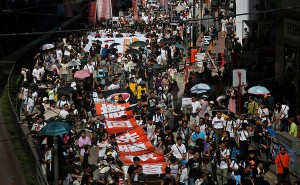That’s where I am now, and shortly after I landed I remembered all the things I love and hate about it. Not that I ever really forgot. And I definitely love it more than I hate it. But there were the usual frustrations.
Like when my taxi driver dropped me off at the hotel from the airport and drove away without giving me my change. It was only ten kuai, but still.
I decided to make this a budget trip and booked my hotel reservation at Ru Jia at Jiaodaokou. I stayed there with Lisa several months ago and we liked it. What’s not to like for 248 kuai a night at a good location? Alas, this time the main building was occupied and they sent me to a room in an ancillary building. I knew the second I stepped into the room that I was in trouble. It smelled like a toilet. A chinese toilet. And I mean it. The bathroom door was shut and when I opened it it was like being punched in the gut. The toxic vapors, freed by the opening door, soon permeated the room. I went to the front desk and they switched me to the room next door that was even worse, if such is possible. A lady from housekeeping came in and sprayed the room with a Chinese version of Glade, and for a few minutes the stench of human waste was replaced by a sickly lemony scent that soon dissipated and left the room with the same ungodly odor. I knew I had to leave.
Thank God my Chinese friend Ben had met me at the hotel.He recommended a place down the street, Green Tree Inn on Fangjia Hutong near Yonghegong, where I quickly checked in and was assigned a comfortable if spartan room with no foul smell. It was a haven. And it was even cheaper than Ru Jia. For those traveling budget I highly recommend it, and its environment is super-cool, surrounded by coffee shops and bars that in a few months will no doubt turn into another commercialized Nanluoguxiang. But for now, it’s wonderful.
The best thing about Beijing for me is always the people, both my Chinese and foreigner friends. There is nothing like them in Phoenix, I’m afraid. Brilliant, funny, generous, it’s for them that I always return to Beijing, and each time I’m with them I wonder how I could possibly have left China. Actually, back in America I think about it every day.
We all get used to China’s miserably slow, restrictive, ultra-paranoid Internet, but each time I come back it’s something of a shock. It is slower than ever, and my proxy only makes it seem slower yet. Sometimes you want to throw your PC against the wall.
Tonight I went to the gorgeous National Theater to see the opera La Boheme performed by a Korean company. The audience was largely Korean as well. I have absolutely nothing against Koreans, but I had never sat with them in a opera before. They talked through the performance, rummaged through crinkling plastic bags, giggled, got up and walked around… The Chinese and Westerners in the audience were outraged, and an usher finally came in and told them to shut up. Seriously, it was that bad. I paid a lot for these seats, and the performance was ruined. At one point, a Korean boy sitting in front of me simply stood up on his seat and started shouting at his mother, who did nothing to discourage him. I simply didn’t understand it. I’ve been to many operas with a Chinese audience and never saw anything like this. Luckily the performance was good enough to drown out the din of talk and laughter. But I, and many around me, were infuriated. I turned around a one point and stage-whispered “Shut Up!” to little avail.
As always, I love the youth and vitality and vibrancy of the city, the irrepressible attitude of the people. I loved less so the stacks of garbage on the alleys around my first hotel, and the usual Beijing oddities that make it Beijing, but all in all I am more enthralled than taken aback.
I had no definite purpose in coming. The city simply beckons me since it is in so many ways my home. That’s never gone away. I’ll strengthen my network, go on some interviews, and pursue some opportunities related to the project I’ve been working on for several months, the one that keeps me from blogging like I used to. For all the aggravation, I am very glad I came. There’s no place like home.
I’m going to be rushed, but if anyone wants to meet up please tell me and I’ll see what I can do. And now, as the lingering jet lag and the strain of a long day come together, I think I’ll pass out. If anything of interest transpires I’ll be sure come back and let you know.
Disclaimer: This post was written in a vintage jet lag/exhaustion stupor. Hope I am not flush with embarrassment when I see it in the morning.

Comments